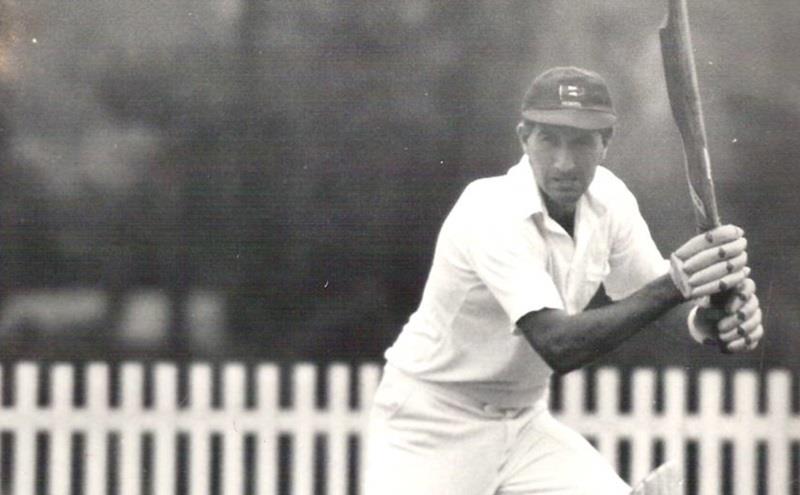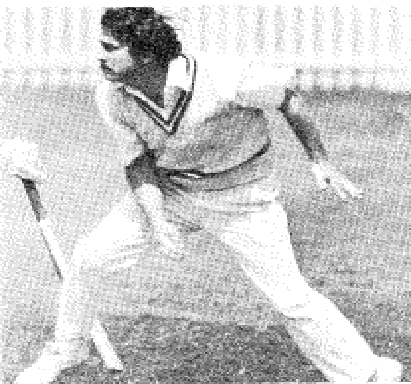Double Trouble - Penrith Cricket Club 1979 - 80
Penrith Cricket Club | January 11, 2024

The First Grade made the Final again, a major achievement; but there was major disappointment too: not only was the Final lost, and heavily at that, in the Club Championship we dropped from sixth in the previous season to eleventh, reflecting a poor Second Grade result.
Thirds and Fourths both improved and, the Poidevin-Gray had its best result since inception. In the Green Shield, Richard Magin was outstanding, winning the Cricketers Club of NSW Award as best batsman of the Green Shield Series and was selected in the Combined Green Shield Firsts to play Country. Also at the youth level, the Club helped organise locally, and stage, a very successful schoolboys' knockout competition. The inaugural winners were St Marys High. Management hoped it would become an annual event with more teams.
There was a transformation at Cook Park under Jon Llewelyn and his Assistants Tim Sullivan and Barry Dukes. Management reported: “There can now be little doubt the Club has the best two ovals in the Sydney Competition”.
The Club’s new Treasurer Allan Blanche noted that parking on football days at Penrith Park—“a good money-spinner ($3415 income)”— had become a problem and called on more support from members: “Surely it is not asking too much of you to help out on just one day”. He was also confronted by management’s decision to introduce monetary bonuses for the best performers in First Grade, where six batsmen exceeded the then magical 400 aggregate; there were five centuries, 15 fifties and, three bowlers took more than 30 wickets. This orgy of success shell-shocked The Colonel: “Bonus payments got a little out of hand and we exceeded our expected expenditure”. Guidelines were sure to be revised the following season! The Club had $7640 in the bank.
After the First Grade Final Captain John Benaud retired, if only on a somewhat temporary basis, and devoted his cricket interest to coaching at junior level. He said: “I have been lucky enough to play two Finals with Penrith but I have been unlucky enough to pick up two wooden spoons, too. Running last is a tough business, hopefully it is all behind us now. There seems to be a good spirit … some more would be handy if we are to win the ultimate, the Club Championship. In his seven seasons Benaud figured in four Record Partnerships, Third Wicket with Geoff Davies 143 (twice), Fifth Wicket with David Laming 177* and Sixth Wicket with Rob Stevens 118. The Club showed its appreciation of his leadership and influence through the formative years by organising a dinner at Penrith Golf Club and a Testimonial match at Howell Oval where Benaud’s XI (Penrith players) matched it with Ian Chappell’s Invitation XI (International and State players who had played with or against Benaud).
First Grade (2nd-52pts)
First Grade’s effort to make back-to-back Finals was all the more meritorious because after round five they were on only six points and, according to the usual knockers, “heading for mediocrity”. In the next ten rounds the team won eight matches, one outright, and finished on 58 points.
The team was ‘on a roll’ when it went into the Semi-final against Balmain (who had in the line-up Mike Gatting, later to captain England) at Howell: Penrith 240 (Gary Donlan 49*, Graeme Thorpe 44, Ron Halse 43) defeated Balmain 130 (Gary Donlan 4/19, Graeme Pitty 3/22) and 6/107.
But, in the Final against Randwick, also at Howell, Penrith’s form was as lacklustre as at the season’s beginning. Batting first, Penrith succumbed for 113. Steve Small (30) and Graeme Thorpe (21) were the best and for Randwick, a young fellow named Mike Whitney took 4/28. In his pre-match game-plan discussion Captain John Benaud had warned his batsmen about Whitney’s ‘angle’ from wide of the crease … “right-handers, watch your leg stump!” Benaud was out bowled … behind his legs by Whitney! Randwick made 7/452. Former Test opener Alan Turner was superb with 230 not out, best for Penrith were Ken Hall (3/75) and Ron Halse (2/43). Despite the presence of a new talent, the whippy left-arm pace bowler Graeme Pitty, the bowling lacked penetration, averaging 23.16 for the season, compared to the previous premiership season’s 18.15.
Highlights
- Steve Small (Player of the Year) scored 721 runs @ 42.41 (Club record), including 141 v Balmain, 100 v North Sydney, 92 v Northern District, 73 v St George, 56* v Mosman and 50 v Uni of NSW, first player to score two centuries in a season
- John Benaud scored 471 runs @ 31.40, including 118* v Waverley, 95 v Sutherland
- David Laming scored 490 runs @ 35.00, including 112 v Bankstown, 92 v Gordon, 74* v Cumberland, 51* v Waverley
- Trevor Everest scored 466 runs @ 27.41, including 104 v Balmain and 51 v Wests
- Ken Hall scored 435 runs @ 27.19, including 73 v Manly and 60 v Sydney Uni, took 31 wickets @ 17.50
- Les Andrews scored 259 runs @ 21.58, including 52 v Northern District, took 28 catches and made six stumpings
- Graeme Thorpe scored 438 runs @ 23.05, including 58 v North Sydney
- Gary Donlan took 41 wickets @ 17.50, including 6/34 v Uni of NSW, 6/48 v Cumberland
- Graeme Pitty took 30 wickets @ 21.77
- Peter Clough took 27 wickets @ 29.26
- Ron Halse scored 211 runs @ 21.10 and took 17 wickets @ 27.
Runs for: 4026 Wickets lost 141 Average 28.55
Runs against: 3682 Wickets taken 159 Average 23.16
Second Grade (17th-18)
Captain Tony Carroll: “It is traditional for Penrith Second Grade Captains that life is not meant to be easy”. The team lacked a strike bowler. Carroll again: “Tim Sullivan, the quickest was dropped after a poor start but has the potential to go higher; forget the theories Tim, just run up and bowl, straight and fast”. Tony Radanovic was the leading wicket-taker but announced he was going to Queensland to further his business career. Carroll again: “One of the best clubmen we have had”.
Highlights
- Rob Stevens scored 483 runs @ 28.41, including 99 v Sydney Uni, 81 v Gordon and 63 v St George
- Bob Clarence scored 451 runs @ 25.05, including 103 v Gordon
- Charlie Doyle scored 339 runs @ 37.66, including 83 v Sydney Uni, 51 v North Sydney
- Tony Radanovic took 32 wickets @ 20.47, including 6/70 v Wests, 5/65 v Sutherland
- Peter Savage took 22 wickets @ 25.68
- Neil Hooper took 19 wickets @ 23.47 and scored 162 runs @ 20.25 including 54 v Balmain
Runs for: 2945 Wickets lost 133 Average 22.14
Runs against: 2757 Wickets taken 104 Average 26.50
Third Grade (12th-30)
Captain Trevor Wholohan: “Tim Sullivan was outstanding against Bankstown taking 8/62 off 32 overs to give us a win by one run”. The batting was starting to show good signs. There were three Third Grade Record Partnerships, 133 by Pat Doyle and Tony Diaczok, Second Wicket v Sydney Uni; 75 by Doug Evans and Mike Stewart, Ninth Wicket v Macquarie Uni; 37 by Mike Stewart and John Klincke, Tenth Wicket v Macquarie Uni. Nine batsmen made scores over 50, the best 97 by the determined Tony Diaczok.
Highlights
- Mark Betros scored 364 runs @ 24.26, including 83 v Gordon and 52 v Sutherland
- Pat Doyle scored 357 @ 21, including 76 v Sydney Uni and 76 v Uni of NSW
- Stuart Green scored 280 runs @ 23.33, including 53 v Sydney Uni
- David Williams scored 233 runs @ 25.88, including 67 v Balmain
- Doug Evans took 25 wickets @ 18.76, including 6/70 v St George, 6/64 v Uni of NSW and 6/64 v Macquarie Uni and scored 209 runs @ 17.42, including 61 v Macquarie Uni
- Tim Sullivan took 21 wickets @ 17.57 and scored 156 runs @ 31.20, including 64 v Sutherland
- Ray Eldridge took 6/47 v Sydney Uni
- Doug Hardcastle took 24 catches and made five stumpings
Runs for: 2855 Wickets lost 136 Average 20.99
Runs against: 2837 Wickets taken 119 Average 23.84
Fourth Grade (11th-34)
Captain Barry Clarence: “As well as youth and inexperience, a factor contributing to a disappointing season was the lack of depth. If the Club is going to improve its standings in the lower Grades it will be necessary to build a stronger Fifth Grade side that will get experience on turf.” He had a good point because 37 players were called up for the Fifths (playing in the local competition) and still the team played short on occasions. Club President Trevor Wholohan noted in the Annual Report: “It is imperative the Club obtain the use of a third turf pitch so we can compete in the NSWCA Fifth Grade”.
Highlights
- Barry Clarence scored 365 @ 26.07, including 52 v Sydney Uni
- David Blake scored 356 runs @ 22.25, including 57 v Sutherland
- David Thomas scored 292 runs @ 20.86, including 82 v Sutherland
- Mark Pratt scored 266 runs @ 22.16, including 90 v Gordon, 58 v Sutherland
- Jon Llewelyn took 21 wickets @ 12.14, including 5/49 v Waverley
- Mike Gibson took 21 wickets @ 16.57, including 5/25 v Macquarie Uni
- Richard Harvey took 19 wickets @ 19.74, including 6/72 v Uni of NSW
- Peter Godfrey took 16 wickets @ 23.50, including 5/35 v Southern Districts
Runs for: 2639 Wickets lost 155 Average 17.02
Runs against: 2710 Wickets taken 137 Average 19.78
Poidevin Gray (6th)
Manager Tony Radanovic noted: “Brian Wood from Bathurst in his only two games scored 43* and 48 and we look forward to having him with the Club next season”.
Highlights
- David Laming scored 148 runs @ 49.30, including 66 v Sydney and 63 v Bankstown
- David Williams scored 109 runs @ 36.30, including 45* v Petersham
- Ray Eldridge took 11 wickets @ 9.09, including 5/19 v Petersham
Green Shield (7th)
Richard Magin’s record-breaking series rightly earned him representative selection but manager Bill Jamieson was clearly frustrated by that singular success. He said: “Still of concern is the selection of the representative teams. An example is the representation gained by Bankstown and Waverley, a total of seven to Penrith’s one. Match results against these two clubs when we were obviously superior makes this difficult to understand”.
Highlights
- Richard Magin scored 333 runs @ 83.25, a record, including 131* v Bankstown, also a record, 81 v Waverley and 72 v Sutherland and took 7 wickets @ 13.7, including 3/31 v Bankstown
- Jeff Stanton scored 161 runs @ 32.25, including 46 v Bankstown
- Richard Magin and Jeff Stanton 144 v Bankstown for the 4th wicket
- Craig Brown took five wickets @ 13.00, including a hat-trick (3/7) v Randwick
KEN HALL
The way some players walk—Ron ‘One Short’ Halse and Bob ‘The Greyhound’ Clarence—seems to attract the mischievous attention of team-mates and inspires nicknames. Ken Hall’s was ‘Emu’ but it could just as easily have been ‘Cammo’ after the Cammack Award for Outstanding All-rounder, which he won continuously from 1977/78 until 1982/83.
He was one of the renowned Halls ‘team’ from the Hawkesbury District where he played with the Wilberforce Club. He came to Penrith Club, then Nepean, in 1975/76 and played continuously to 1982/83, thus featuring in both First Grade Premiership wins.
Emu is a legend, and to become a legend entails not just performing but doing it with a certain amount of character. Such as: he was running in to bowl at Caringbah when there was a crunching of metal on the street outside and even from the centre Emu could see his much-loved Ford was one of three cars that had been sideswiped by a wayward motorist. He dropped the ball, veered off, jumped the fence, ran to his car, observed the damage and, when the police arrived, advised the sergeant to “book the bitch, she’s been on the sherry”.
He was forthright in team meetings, too, advising others that “when I call for a catch get out of my way”. He was tough on young blokes if they were careless, telling them “my grandmother could have caught that”, or, “I catch them with me teeth”. When he was First Grade Captain and someone hadn’t met his high requirements he’d lament: “Fair dinkum, I ask the Selectors for replacements and they send me Third Graders”.
This extract from a report in The Sun-Herald (1979) captures his competitive nature: “Penrith batsman Ken Hall was given out in unusual circumstances by umpire Ian Jones for hitting the ball twice. He miscued a ball off the bat from the bowling of Sutherland’s Graham Barry and then hit it away from the converging field to avoid being run out.”
Ken Hall scored 2842 runs @ 29.00 with 14 scores over 50, best 133* v North Sydney in 1978/79, 103* v Northern District 1980/81. He shared a seventh wicket First Grade Record Partnership of 96 with Mal Cobcroft. He took 228 wickets @ 18.50 with 11 hauls of five wickets or better, best 8/17 v Manly and 8/69 v Cumberland, both in 1977/78. His best season was 1982/83, scoring 514 runs @ 39.53, took 33 wickets @ 14.33 and 20 catches.
He was Club Player of the Year in 1977/78 and 1978/79. He was a right-hand batsman, left-arm medium-pace swing bowler and those bucket hands never dropped a catch they could reach. He also played with Hawkesbury and Bankstown, bowling mainly left-arm orthodox spin with the latter.
RON HALSE
The game is the poorer in modern times for its lack of bowlers like Ron Halse, exponents of swing and cut, fast medium types who give the ball air rather than jamming it into the pitch two-thirds down. His proppy gait, the outcome of a Soccer injury, never hampered his underrated talent.
He was a Ryde boy and played his early cricket at Northern District where he was educated in the finer points of the game (sportsmanship, guts, finesse, sledging etc.) by Sheffield Shield player Neil Marks and veteran administrator Austen Hughes.
He came to the Club in 1976/77 (married Narelle Bates of the famous St George cycling family and moved to Hebersham then Springwood) and impressed selectors with his ability to swing the ball late, and away from the bat. He was a technically sound batsman, with patience (which will surprise spectators who have observed him on the tennis court), and could engineer late-order revivals. He was a key member of the 1978/79 Premiership winning First Grade. That was his best season taking 29 wickets @ 9.62 and scoring 279 runs.
In the main he played Firsts and Seconds but later, determined to promote experience among young players, he came back (with John Benaud) to play in and eventually captain Fifths, supported by his good friend Rod Evans. It was a successful enterprise that also impacted winningly on the Green Shield and Poidevin-Gray teams.
He later became Club President. Career in First and Second Grade: 741 runs @ 14.62; 111 wickets @ 20.38.

Ron Halse. Swing and seam
TREVOR EVEREST
Trevor Everest was a country boy from around Lismore. He came to Penrith while working at Bargo with the Main Roads Department. He started in the ‘Fifths’ in the park and finished in Firsts.
To many observers Country=Commonsense and Trevor, accorded the obvious nickname of ‘Sherpa’, had it in spades. He developed into a very well organised top order batsman, opener or No.3, and a brilliant first slip, which was always a challenge when Peter Clough, Ron Halse and Gary Donlan were on song and making the ball ‘talk’.
John Benaud: “He looks innocuous enough, no spectacular shots, and blinking behind his spectacles, but he is unflappable”. His best season was 1979/80 (466 runs @ 27.41) and Benaud thought he had the potential to play at least State Second XI. He figured in a Record Partnership of 207 for the First Wicket with Steve Small against Balmain in 1979/80.
Benaud: “Steve is a most aggressive type … yet Trevor ran neck and neck with him right up to the century. I hope that record stands forever, for Trevor is a young cricketer who should be an example to all”. Career: 1771 runs @ 21.20.








